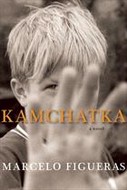 Kamchatka by Marcelo Figueras
Kamchatka by Marcelo Figueras
Translated from the Spanish by Frank Wynne
Black Cat, New York, 2010
Borrowed from the library. I have to thank Stu at Winstonsdad’s Blog for introducing me to this wonderful, funny and moving book. This book was nominated for the Booktrust 2011 Independent Foreign Fiction Prize.
What does a child do when the world around him starts to fall apart? Kamchatka is a story of a ten-year-old boy and his family living in Buenos Aires in1976. The boy, who eventually calls himself Harry after Harry Houdini, and his brother, the “Midget”, live in a world of school and comic books, TV, friends and loving parents. His biggest thrills are the games of Risk he plays with his father.
As the military takes over the country, Harry’s parents friends start disappearing. Eventually his mother pulls him from school and the family travels outside of the city to stay in a country house.
Kamchatka is Harry’s story, we hear him looking back on his life as a ten-year-old. I found this to be one of the best portrayals of a young person I have read in quite a while, and knowing some of the history of Argentina during that time only added to the tension that Figueras creates in his novel.
Since the uncertainties of the present weighed heavily on me, I had been spending a lot of time thinking about my future. The idea of becoming an escape artist struck me as clearly as a vision: once the notion was firmly planted in my brain, all my worries disappeared. Now I had a plan, something that, in the near future, would tie up all the loose ends of my circumstances. From page 95.
Then there is Harry as an adult, looking back on his life, his family, his country.
We get our first glimpses of the big wide world from those we love unconditionally. If we see our elders suffer because they cannot get a job, or see them demoted, or working for a pittance, our compassion translates these observations and we conclude the world outside is cruel and brutal. (This is politics.) If we hear our parents badmouthing certain politicians and agreeing with their opponents, our compassion translates these observations and we conclude that the former are bad guys and the latter are good guys. (This is politics.) If we observe palpable fear in our parents at the very sight of soldiers and policemen, our compassion translates this observation and we conclude that, though all children have bogeyman, ours wear uniforms. (This is politics.) From page 39.
Kamchatka is presented not in chapters but in periods, like a school day: Biology, Geology, Language, Astronomy, History, allowing Harry to integrate as an adult the lessons he learned as a child, allowing him to tell his story. He constantly references his favorite books, books that help him make sense of his past and help him to move into his future. Kamchatka, like most books I love, is a novel about stories. It is through stories that we tell our truths and hold on to our histories.
I believe that stories do not end, because even when the protagonists are dead, their actions still have an impact on the living. This is why I believe that History is like an ocean into which rivers of individual histories flow. Everything that has gone before underpins the present; we continue those stories just as those who come after us continue ours. We are bound together in a web that spans all of space; a web large enough to include all those alive today, but also all those of yesterday and tomorrow. From pages 273/274.
I think Frank Wynne has done a fantastic job of translation, maintaining the spirit of Figueras’ intention. I hope there are other Figueras translations in the works, I cannot wait to read more.

This sounds like an amazing and beautiful book. I love the quotes you shared. It seems like the translator did an amazing job to make it sound as poetic and lovely in English as it was in its native tongue.
Thanks, Jenner. Kamchatka is a wonderful and very moving book.
*redownloads from Netgalley*
Great post as always Gavin! :)
I can’t wait to read what you think about Kamchatka!
Pingback: Sunday Salon – With Sun! | Page247
I read this book last month, although I’ve been unable to put together any thoughts about it. It’s a hard book to discuss, although you certainly managed to do a great job!
Thanks, Kamchatka is not an easy book to write about, there is so much to it.
I forgot about this book! Thanks for such a great review!
I hope you read Kamchatka. I’d love to see what you think of it.
Many thanks for the mention Gavin ,Im so pleased you like this book too ,it is a b ook i will be telling people about for a good while ,all the best stu
Ooh! I’m still waiting to get my hands on a copy of this one (and much of the IFF shortlist). I’m glad to know it will be worth the wait!
Pingback: Sunday Salon – Late Again | Page247